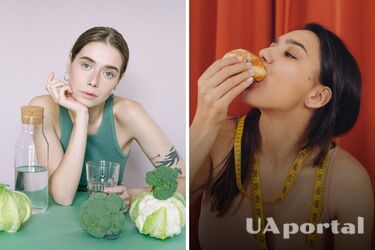Guilt and small portions: Signs of an eating disorder

Many people think that healthy eating is about diets, calorie counts, and small portions. But it is not so. A healthy diet means a balanced and varied diet.
At a time when a slim figure has become an almost mandatory option for everyone, more and more people are faced with eating disorders.
UaPortal has collected the main signs of RHP that should not be ignored.
You are depriving yourself of the food you want
"It's one thing to deny yourself your favorite food when you're just not hungry, and quite another to avoid it altogether," says sports nutritionist Brittany Wehrle.
If for you the main criterion for eating food is its calorie content and not its taste, give yourself an answer to the question of why you are doing it.
Focus on "ecological food".
You try to eat only healthy food. It's good when it doesn't turn into an obsession that causes you to significantly reduce your diet.
But think: is it logical to deprive yourself of plain chocolate and instead eat organic chocolate, if it also contains the same sugar?
You don't eat out
Restaurants and food delivery are taboo for you because there are only "unhealthy dishes".
But this behavior does not allow you to fully socialize, because the desire to eat at home deprives you of participation in any activities outside it.
You are afraid to eat "forbidden food"
You are afraid of junk food
You are afraid to eat "forbidden food". You don't have anxiety or worry about eating food you don't normally eat. Allowing yourself a burger or ice cream is normal.
You control the portion size
The idea of weighing food and controlling portion sizes is very popular now. But it should not turn into an obsession. First of all, listen to the needs of the body, and even better, consult a nutritionist who will calculate the exact amount of proteins, fats, and carbohydrates for the benefit of your body.
Divide food into "good" and "bad"
"A healthy approach to eating allows for flexibility and promotes a healthy relationship where there are no 'good' or 'bad' foods," says nutritionist Rebecca Ditkoff.
Food is not only a necessary component of our existence but also a source of pleasure.
You feel guilty while eating
You restrict or avoid food because you feel guilty when you eat.
"This moralizing of food often extends to the person making a classification, so that they start to feel like a good or bad, healthy or unhealthy person depending on what they eat," says nutritionist Nina Mills.
You "work off" food
We ate candy - 40 minutes of cardio. Are we familiar?
"Another telltale sign of early problems is that people often view exercise as a way to 'earn' or 'burn' food," says nutritionist Brittany Wehrle.
It is not necessary to run to the gym immediately after eating a piece of pizza or cake. It's best to do this around your regular schedule.
You don't have to work out or earn your living by working out.
You judge people by their weight
You usually compliment people based on their weight or judge people by their weight. This could be a sign of an eating disorder in you. It shows that the most important thing for you is your body and its size. And all must fit into the criteria of "slenderness".
Read also: How to keep your teeth healthy.
Arrange yourself a "cheat meal"
If you eat right 6 days a week, and on the seventh, you allow yourself everything, this is a sign of RHP. Because during a cheat meal, you lose control over yourself, eat a lot of "forbidden" food, and as a result feel not pleasure, but a huge sense of guilt.
Therefore, allow yourself what you want on any day, not on a schedule.
WARNING! The information in this article is for educational and informational purposes only and is not intended as medical or health advice. Always consult a physician or other qualified professional with any health-related questions.
We will remind you that we have already written about what kind of coffee you should give up.
If you want to receive the latest news about the war and events in Ukraine, subscribe to our Telegram channel!
